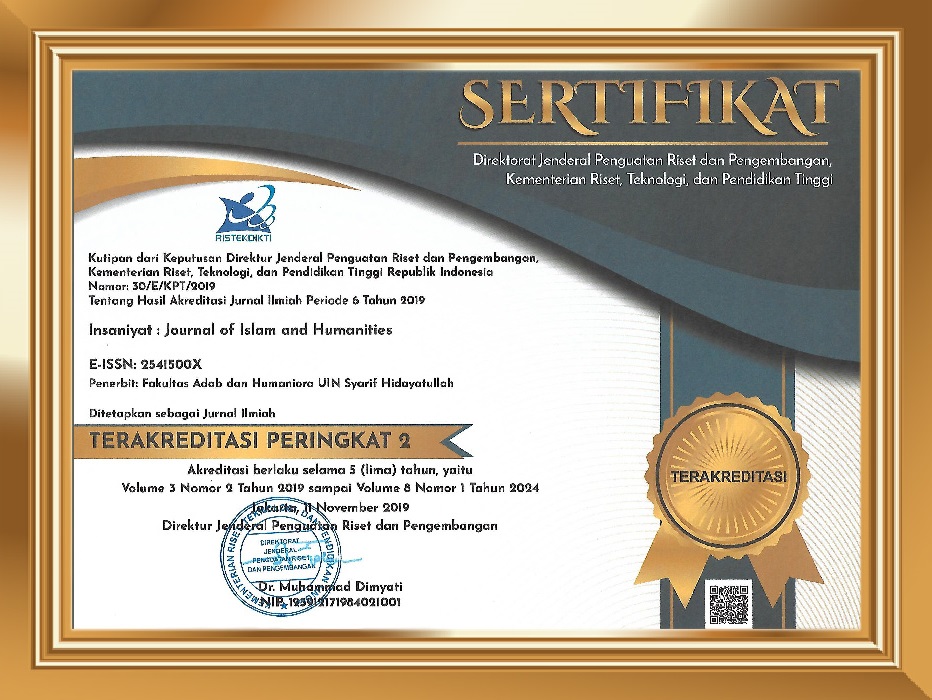Rewriting '9/11 or US invation of Iraq' Traumatic Memories in Shaila Abdullah's Saffron Dreams
Abstract
This paper examines how the US-Pakistani Muslimahs or Muslim women live in the US after US Invasion of Iraq (2003) in Shaila Abdullah’s Saffron Dreams (2009). In the novel, Abdullah depicts her characters as victims of the 9/11 attacks to challenge US dominance in 9/11 narratives, which tend to show how the US becomes the victim, instead of the perpetrator of the US invasion of Iraq. By engaging with postcolonialism and 9/11 studies, this paper questions US anti-Muslim racism, which tends to associate Muslims with terrorism by exploring the ideas of trauma of being attacked by US extremists. This paper found that Abdullah’s Saffron Dreams depicts US Pakistani Muslimah struggling to seek social justice and US belonging. In doing so, this novel resists anti-Muslim racism by depicting its protagonists as facing several trauma, which is ironically continued by her next generation, who is suffering from multiple born defect representing their endless traumatic experiences living in the US after US invasion of Iraq. By exploring US-Pakistani-Muslimah stories, this novel suggests how the Pakistani Muslim diaspora not only struggles to live in the US after the US invasion of Iraq but also faces multiple trauma, especially being attacked by US extremists. This multiple trauma work to question US-trauma centric in dominant narratives. Thus, it is important to investigate traumatic stories from marginal experiences to undermine dominant narratives, which tend to exclude marginal memories after US invasion of Iraq from US belonging.
Keywords
References
Abdullah, S. (2009). Saffron Dreams. Modern History Press.
Alsultany, Evelyn. (2012). Arabs and Muslims in the Media: Race and Representation after 9/11. New York UP.
Brah, A. (1996). Cartographies of Diaspora: Contesting Identities. Routledge.
Chambers, Claire (2011). A comparative approach to Pakistani fiction in English. Journal of Postcolonial Writing, 47:2. p. 122-134.
Esposito, John and Ibrahim Kalin. (2011). Islamophobia: The Challenge of Pluralism in the 21st Century. Oxford UP.
Gray, Richard. 2011. After the Fall: American Literature since 9/11. Chichester: Wiley-Blackwell.
Fanon, Frantz. 1965. The wretched of the earth. London: MacGibbon & Kee.
Mishra, Pankaj. 2007. "The End of Innocence." Guardian, 19 May.
---. 2012. From the Ruins of Empire: The Revolt Against the West and the Remaking of Asia. London: Allen Lane.
Hall, D. (2010). Review, Shailah Abdullah’s Saffron Dreams. Pakistaniaat: A Journal of Pakistan Studies, 2.3.
Harvey, David. 2005. The New Imperialism. Oxford: Oxford University Press.
Kopel, David B. 2019. “Vigilantism.” Salem Press Encyclopedia. http://search.ebscohost.com.uoelibrary.idm.oclc.org/login.aspx?direct=true&db=ers&AN=95343177&site=eds-live&scope=site
Kundnani, Arun, and Deepa Kumar. 2019. Race, Surveillance, and Empire. International Socialist Review, 2 May. https://isreview.org/issue/96/race-surveillance-and-empire
King, Bruce (2016). Losing paradise now. Journal of Postcolonial Writing, 52:2, p. 225-231.
Lazarus, N. (2006). Postcolonial Studies after the Invasion of Iraq. New Formations, 59. p. 10-22.
McNeill, Dougal (2016). Exoticizing the past in contemporary neo-historical fiction. Journal of Postcolonial Writing, 52:5. p. 638-639.
Mansoor, Asma (2014). Exploring Alternativism: South Asian Muslim Women's English Fiction, South Asian Review, 35:2, p. 47-65
Massad, Joseph. 2015. Islam in Liberalism. Chicago: University of Chicago Press.
Morey, Peter, and Amina Yaqin. (2011). Framing Muslims: Stereotyping and Representation after 9/11. Harvard UP.
Parekh, Bhikhu C. 2006. Rethinking Multiculturalism: Cultural Diversity and Political Theory. London: Palgrave Macmillan.
Renton, James. 2018. “The Global Order of Muslim Surveillance and Its Thought Architecture.” Ethnic and Racial Studies, no. 12: 2125.
Sacirbey, O. (2016, August 24). New Poll Finds Americans Evenly Divided in Views of Muslims. The Washington Post.
Said, E. W. (1978). Orientalism. Routledge and Kegan Paul.
Said, E. W. (1994a). Covering Islam: How the Media and the Experts
Determine How We See the Rest of the World. Vintage.
Said, E. W. (1994b). Culture and Imperialism. Vintage.
Shamsie, Muneeza (2011). Duality and diversity in Pakistani English literature. Journal of Postcolonial Writing, 47:2, p. 119-121.
Sorgun, S. (2011). Like. Diss. Northern Illinois University.
Versluys, Kristiaan. 2009. Out of the Blue: September 11 and the Novel. New York: Columbia University Press.
DOI: 10.15408/insaniyat.v7i2.29328
Refbacks
- There are currently no refbacks.







